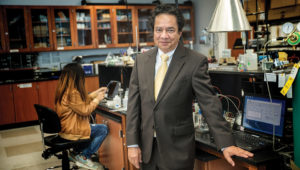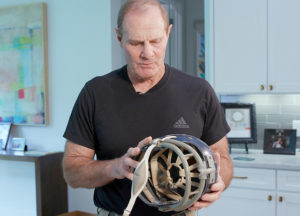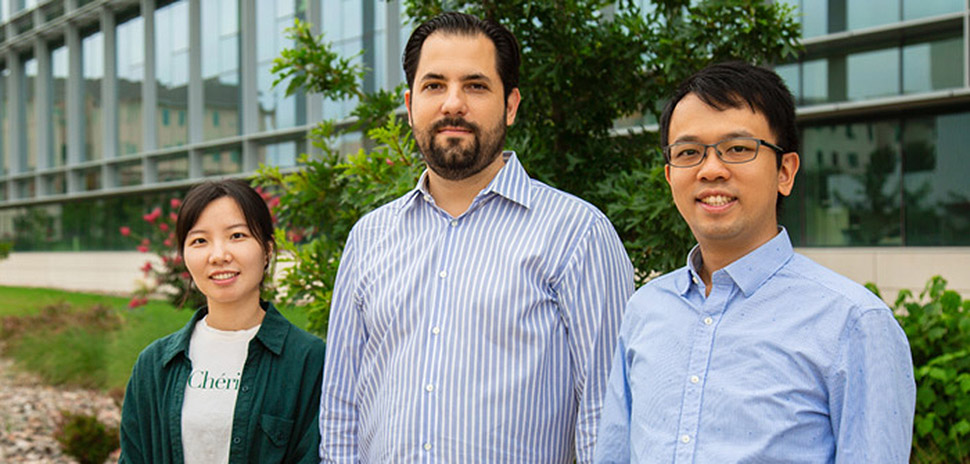![]() Every week, we do a little research of our own. We’re looking for scientists, professors, engineers, entrepreneurs—anybody, really—engaging in research and development across North Texas.
Every week, we do a little research of our own. We’re looking for scientists, professors, engineers, entrepreneurs—anybody, really—engaging in research and development across North Texas.
There’s plenty of good work being done. If you want to put R&D under your microscope, sign up for our e-newsletter.
UTA chemist creates device to collect, analyze liquids in space
In a galaxy far, far away, a device engineered by UT Arlington professor Purnendu “Sandy” Dasgupta could some day be whizzing through space, collecting drops of liquid, and analyzing what’s in them for conditions that could support life.

Purnendu “Sandy” Dasgupta in his lab at UT Arlington. [Photo: University of Texas at Arlington]
Dasgupta, a chemist, is the Hamish Small Chair in Ion Analysis in the Department of Chemistry and Biochemistry and an adjunct professor in the departments of Physics and Electrical Engineering.
He’s created an instrument platform called open-tubular chromatography to detect and separate ions. It’s designed for space travel and uses small amounts of liquid samples injected into tubes that are one-fourth the diameter of the finest human hair.
Dasgupta’s instrument can analyze and present results on a single drop of liquid while flying through or by the atmospheres of other planets and moons, UTA said in a statement.
“There are fundamental incompatibilities between how one measures key ions in an Earth-bound lab and what NASA needs us to do in space,” Dasgupta said in the statement. “We had to devise a method to detect and separate ions that uses very little power and does not take up too much space. Every little bit of weight, volume and power is expensive when traveling to another planet.”
UTA said Dasgupta’s project was supported by nearly $1 million from NASA through a Planetary Instrument Concepts for the Advancement of Solar System Observations, or PICASSO, grant. He has received an additional $1.4 million Maturation of Instruments for Solar System Exploration, or MatISSE, grant from NASA that will allow him to continue to strengthen the devices and prove it can tolerate the harsh conditions and lengthy travel times of space exploration.
UT Southwestern study probes how concussions affect retired athletes
The potentially harmful results of concussions sustained by athletes, especially football players, has garnered a lot of attention in recent years. It’s led to enhanced concussion awareness that now runs throughout most sports.

Brian Duncan looks at a football helmet he used in high school. [Photo: UT Southwestern]
A recently published study by UT Southwestern concerning how retired NFL players show no significant association between the length of the players’ careers, the number of concussions they sustained, and the level of cognitive function later in life, according to a statement. UTSW said that other research has found comparable results in high school athletes.
“The perception is that if you play football and hit your head a bunch, you’re going to have cognitive problems when you get older,” Dr. Nyaz Didehbani, a neuropsychologist who led the UT Southwestern study, said in the statement. “This new research suggests that we don’t know the entire story yet.”
One of the former athletes in UT Southwestern’s study is Brian Duncan, who grew up and currently lives in Graham, two hours west of Dallas. He played high school, college, and professional football, as well as competed in amateur boxing and rodeos in Texas.
“I got the heck beat out of me in a lot of ways,” Duncan said. “But back then no one thought about concussions. I’m fortunate it hasn’t affected me.”
Duncan is one of more than 70 former NFL players participating in research at UT Southwestern’s O’Donnell Brain Institute to better assess factors that lead to brain disorders. UT Southwestern said that some participants have mild to severe forms of cognitive impairment, but most, like Duncan, have shown show no signs of it, and some are curious about why their lengthy concussion history has not led them to a similar fate.

UT Dallas doctoral student Xianli Jiang, left, Faruck Morcos, assistant professor of biological sciences at UT Dallas, and Clement Chan, assistant professor of biology and biochemistry at UT Tyler, worked together on creating a method for changing gene expression in cells. [Photo: UT Dallas]
UT Dallas scientist collaborates on cutting-edge genetic work
Researchers from the University of Texas at Dallas and the University of Texas at Tyler collaborated to engineer biological components able to rewire genetic response pathways, creating a guide for designing new cellular behaviors with potential applications in medicine.
Faruck Morcos of UT Dallas and Clement Chan of UT Tyler worked together on modular versions of repressors—proteins that block genetic instructions—and reported their results in a paper recently published in Nucleic Acids Research.
The scientists have proposed a new strategy to create living cells that are able to sense multiple signals via reporter proteins. The work, which originated from an interdisciplinary field called synthetic biology, could have wide-ranging applications in medical diagnostics, UT Dallas said in a statement.
“The goal of synthetic biology is to use existing biological systems to develop solutions for problems,” Morcos, an assistant professor of biological sciences at UT Dallas, said. “It’s an engineering approach to biology.”
Read more about their important work here.
Read Next
![]()
Get on the list.
Dallas Innovates, every day.
Sign up to keep your eye on what’s new and next in Dallas-Fort Worth, every day.





























